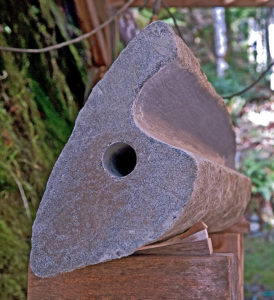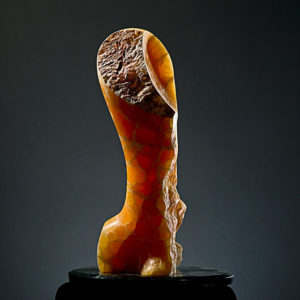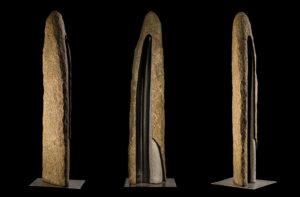Heavy Rocks
Everyone knows rocks
are heavy, dense, and hard, and that
the bigger the rock the heavier it is. Stone
sculptors change rocks’ shapes and
make them smaller.
Sculptors move
stones. Raise them, lower them,
turn them over, upside down, right side
up, and so on. It’s as simple as that and there’s
no getting out of it. It comes with the territory
that rocks are heavy. If I can’t move it
without hurting it or myself,
I can’t carve it.

I lifted this long
600 pound boulder several
times a day for several weeks to turn
it, prop it up with blocks and wedges, and
carve it with various tools.
It’s not just that
bigger rocks are heavier, either,
but much, much worse than that. Every
sculptor knows literally in his or her bones
that if one rock is twice as tall as another, same shape
and same stone, it is eight times as heavy. Four
times as big is sixty-four times as heavy,
and so on up to the sizes
of mountains.
The big takehome
lesson from this is that even to
imagine enlarging even very small sculptures
to ten times their height can make your head swim to
think of the weight. Things can get out of hand in a
quick hurry, get dangerous, get difficult, and
get expensive. They can also get interes-
ting and challenging, which brings
me to what I want to share
with you.
Here as finished
sculptures are Ode to Joy and The
Guardian, both shown above in progress,
and Girlchild Reflected in Her Mother’s Eye.
Ode was too big to lift without the crane
when I started, and I still needed the
crane for the finished Guardian.
Girlchild was far too heavy
for that crane.
Girlchild arrived
from the stoneyard 38″ high and
just under a ton in weight. It rested on a dolly
that I moved by hand dozens of times while carving.
Since completion, it has been moved three times by
commercial crane trucks. Although I could lift
Ode to Joy easily by hand when finished,
its new home is in England, and
they charge to ship both
size and weight.
The old UBC
microbiology building
and ginkgo tree behind Girlchild
will have to go someday, so the
sculpture will need to be
moved at least one
more time.
First published in the Vancouver Observer before I began The Guardian.
Edited March 2021





